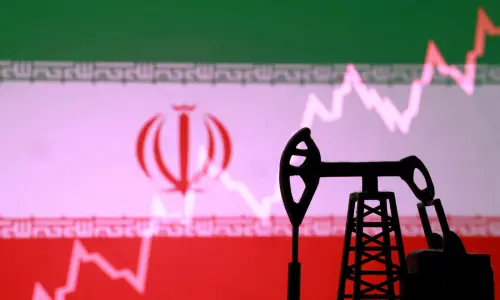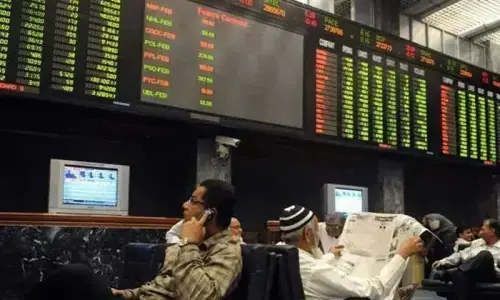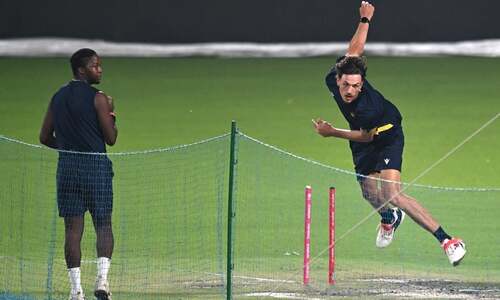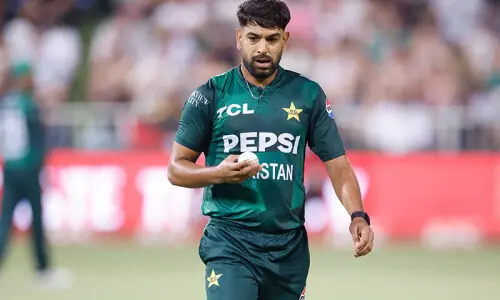FOR this week, let me confess at the beginning that I have nothing to offer on the mess that is Punjab, the courts and the bayanias, or narratives, our parties are offering at breakneck speed. I cannot say if Dost Mazari is in the wrong or Pervaiz Elahi and what is the legal differentiation between party head and parliamentary party leader.
Instead, let me offer you a snippet from a story published by Dawn towards the end of last year. Iftikhar Khan had argued about what could determine the next election in Pakistan. Based on ECP figures, he claimed 45 per cent of the voters in the 2023 election would be under the age of 35. Of these, the report said, around 26pc will be between 26 to 35 years while around 20pc will be between 18 and 25.
Read more: Electorate's youth bulge
There have been many reports, based on similar ECP figures, about the absence of the interest of the youth in the electoral process and their low participation rates. But this can change only if the parties want to and will reach out to and motivate the youth.
However, to reach out to these voters, the parties would first need to understand them. The oldest among these ‘young’ voters was born in 1988, the year that Benazir Bhutto became prime minister. And by the time she (the voter) was walking and talking, Nawaz Sharif had replaced Bhutto. Both the leaders would have left the country by the time she turned 12, perhaps still too young to follow politics too closely. Their return in 2007 would have been watched by an 18-year-old, who was barely old enough to have been interested in or participated in the movement to restore the judiciary. As she entered the workforce, the politics and economy of the country for her would have been the responsibility of the PPP and the PML-N. And Imran Khan might be the only ‘outsider’ to the system unless she came from Balochistan or the former Fata region.
To reach out to young voters, the parties would first need to understand them.
The intrigues of the 1990s when prime ministers were shunted into and out of power as if playing musical chairs and presidents wielded enormous power would be vague memories for her (if at all), even if she was born to a household where politics was actively followed and discussed. Otherwise, she may have watched television channels introduced by Pervez Musharraf. For her, journalists are people who give lectures and shout down politicians but like the latter, many of them have also been around for ever.
If our ‘young’ voter had a younger brother who was born around nine years later, he would now be 26. Born in 1997, he would have been a mere two-year-old when the coup took place and the entire PML-N leadership was put behind bars and their prime minister brought to court in a prison van. And just around 10 when a street protest forced Musharraf out.
By the time he was 19 and at college, PPP would have lost an election and the PML-N would have been in power. He may have seen Nawaz Sharif take oath and heard that he had been prime minister twice before also. Around the time he was probably thinking about what he wanted to do in life and whether his choice would allow him to live comfortably, he would have heard that Nawaz Sharif wanted his daughter to succeed him as party leader.
Among the generation described as millennials, these siblings would have memories of 9/11, the world that came after, along with extremist violence and Islamophobia; but they would also have witnessed the internet explosion. They would have seen computers, laptops, internet, email and mobile phones take over their homes and lives and may have been among the earlier users of Facebook.
The generation the brother and sister belong to constitutes a quarter of the voters in 2023.
Slightly less than a quarter of the voters will have been born after 1995 — a part of Gen Z which entered a world of high-speed internet, Wi-Fi and smartphones. Constant connectivity through their phones is a given for them, as are talk-show discussions and clips of political and religious leaders speaking in different parts of the country.
If an 18-year-old with a menial job and little education is attracted to Saad Rizvi, he can listen to him, regardless of where he lives in Pakistan. He probably is a TikTok user, rather than Twitter, the latter being where the heated debates on the finer points about Constitution and the rule of law take place.
The same teenager was around five when the PPP came to power and he may have dropped out of school when the PML-N was ruling the country. If he followed the Panama trial even vaguely, he may not need much convincing of the ‘corruption’ surrounding the Avenfield apartments. Later, he would hear of the fake accounts and the chaprasi and the papri wallah. And on TikTok he may have heard Imran Khan who harps on about the money stolen by Nawaz Sharif and Asif Ali Zardari and how this ensures the 18-year-old doesn’t have a more comfortable life and a better paying job. This may not convince him to vote for Imran Khan, but it will keep him away from voting for the PPP and PML-N.
One can go on…
Read more: Nationhood and Pakistan
But the point here is not to explain why Imran Khan is popular. Instead, it is to ask how do the other parties, be it the PPP, PML-N or even ANP, view these young voters? How do they plan to reach out to these young people who do not remember and perhaps don’t even care for how the political leadership was treated in the 1970s or 1990s?
For these 30- or 20-something voters, history is not enough to make an election matter. Because the world over, an election is about the here and now. People vote because they believe it will make a difference to their lives. More than the parties’ experience, elections have to be about the voters’ lived experience. Are the political parties asking these questions of themselves?
The writer is a journalist.
Published in Dawn, July 26th, 2022






























